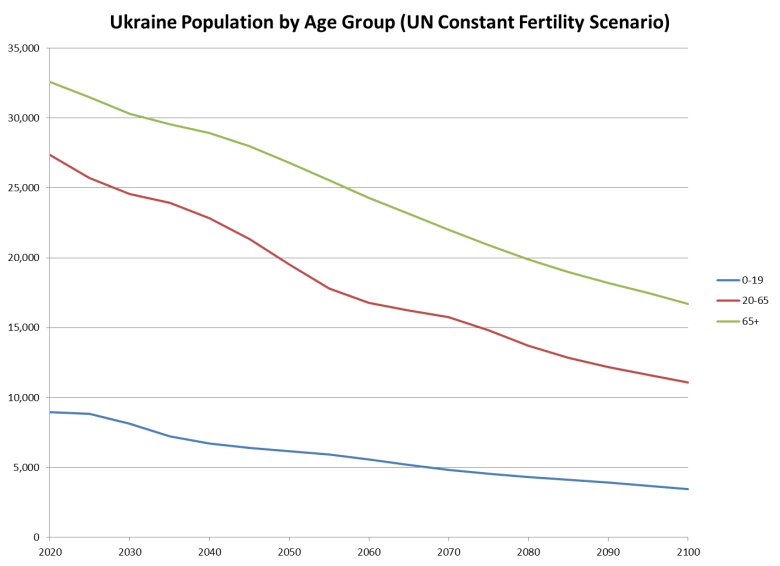Ukraine is the hollow man of Europe: David Goldman
Ukraine is disappearing, for two reasons. It has one of the world’s lowest birth rates at just 1.23 children per female, and one of the world’s highest rates of out-migration. No other country has willed itself out of existence so decisively.
Ukraine’s demographic decline is so pronounced that it should be high on the list of strategic considerations. For what, and for whom, might NATO and Russia go to war?
Ukrainians vote with their feet. Nine million have work abroad, according to the National Security and Defense Council of the Ukraine, and 3.2 million have full-time jobs in other countries. There are only 21 million Ukrainians between the ages of 20 and 55, which suggests that more than two-fifths of prime working-age Ukrainians earn their living elsewhere.
I do not know whether this estimate includes half a million Ukrainian prostitutes working abroad since independence, according to one scholarly estimate.
Even worse, a Wilson Center study reports, Ukraine’s best-educated people are likeliest to leave:
Ukrainians who go abroad to study often view their studies as the first stage of emigration. A survey of Ukrainian students at universities in Poland, Hungary, and the Czech Republic showed that students who studied in these countries had similar motives for doing so. Most said they intended to earn their diplomas in order to work in the EU in the future, since living conditions in Ukraine were unsatisfactory; few planned to return home after graduating. Those who do return may be the ones unable to settle abroad in permanent positions.
 Chart: David P. Goldman, Asia Times
Chart: David P. Goldman, Asia Times
Ukrainians may be having children, but not frequently in Ukraine itself. After years of demographic decline, the country has more citizens over 65 years of age than working-age people between 20 and 65.
At constant fertility, the UN Population Program forecasts its population will fall by more than half in the course of this century. As noted, the country’s main demographic institute thinks the population is already 30% less than the level reported by the official census.
The numbers in the accompanying chart come from the United Nations, but they might be greatly exaggerated. The Ukraine National Academy of Science’s Institute for Demography puts the present Ukrainian population at just 35 million, not the 48 million reported in the official census. (It also forecasts that three out of 10 Ukrainian men now aged 20 will die before the age of 60 due to alcoholism and auto accidents)
There have been instances of national recuperation in fertility rates but under circumstances very different from Ukraine’s. Russia’s coincided with a resurgence of Orthodox Christianity. Hungary also had some improvement in the midst of an economic boom.
If Ukraine becomes the flashpoint for war, it will affirm Karl Marx’s quip that the tragedies of history repeat themselves as farce. Serbia’s fast-growing population in 1914 hungered for land, a demographic imperative that impelled its designs on Austrian Bosnia-Herzegovina. The First World War was tragic, but not entirely pointless.
Ukraine in a few decades won’t be a sovereign nation, let alone a democracy; it will be a geriatric ward supported by a dwindling flow of remittances.
Remittances from overseas workers already comprise 11% of Ukraine’s GDP, according to the World Bank, by far the highest proportion in Eastern Europe with the exception of tiny Moldova.

It is hard to envisage a popular insurgency against Russian or any other invaders. No one goes to the barricades in adult diapers. The most aspirational and energetic young Ukrainians aren’t in Ukraine.
An old 1960’s meme, “What if they gave a war and nobody came?” comes to mind. According to a December 2021 opinion poll, three-quarters of Ukrainians said that rising oil and gas bills were their top worry – not the prospect of a Russian invasion.
That doesn’t suggest a surge of patriotic resentment against Russian threats, but rather a glum mood of national resignation and concern about the petty problems of daily life.
Comments are closed.
